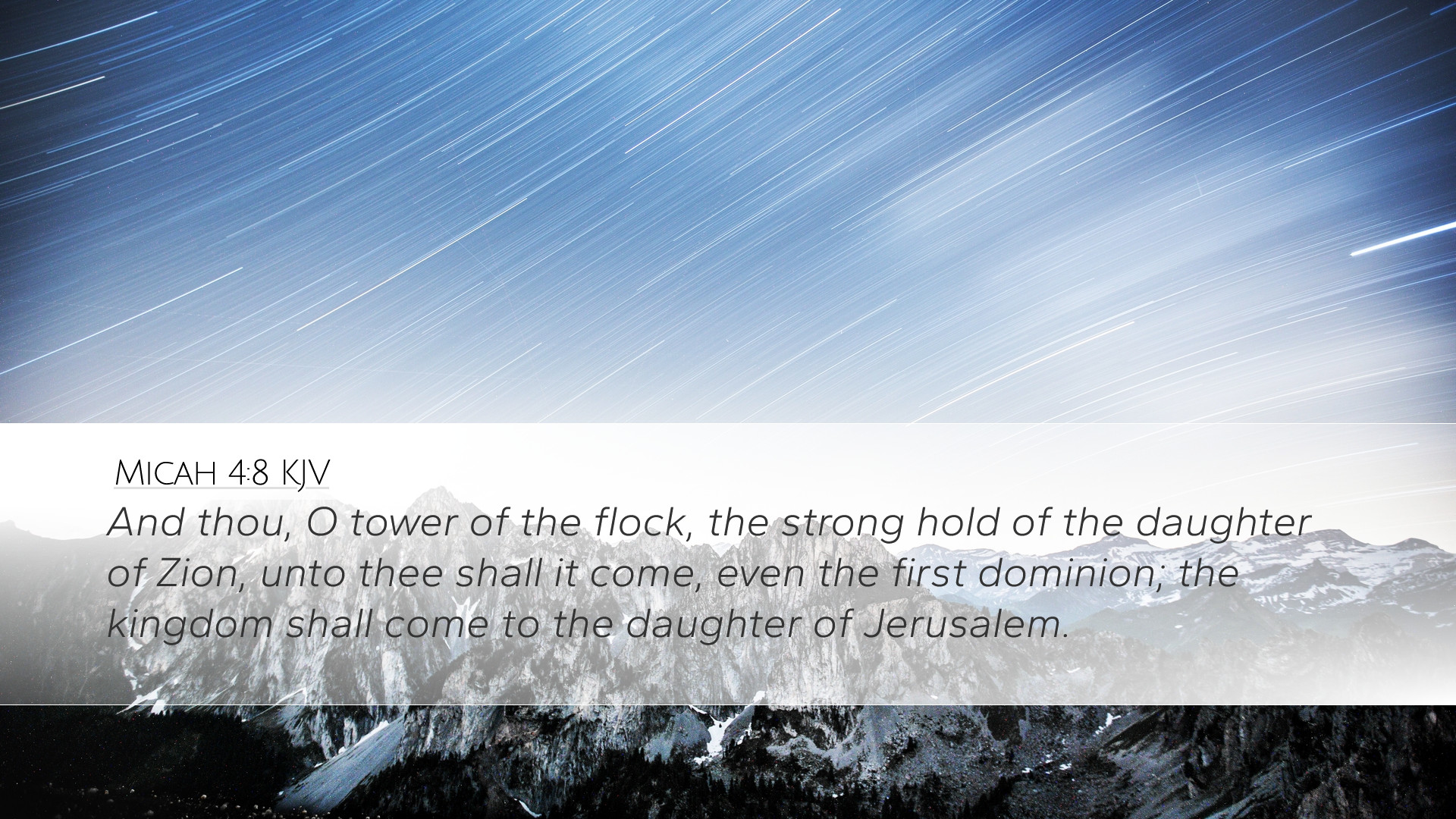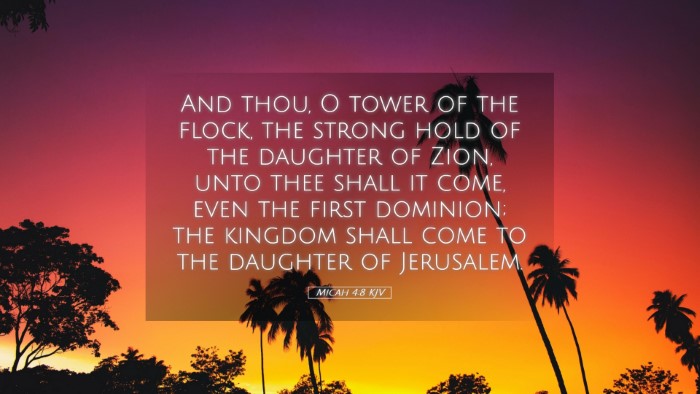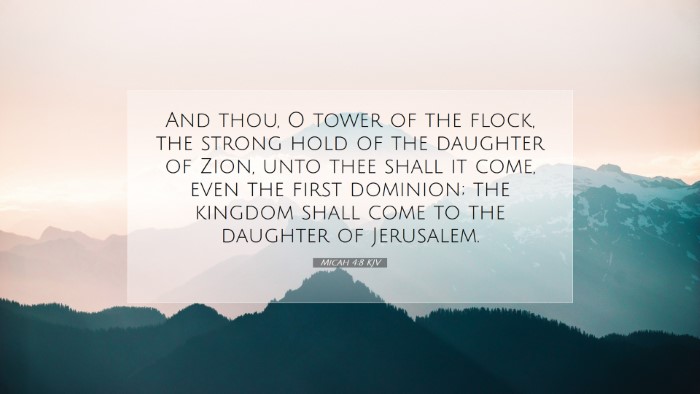Old Testament
Genesis Exodus Leviticus Numbers Deuteronomy Joshua Judges Ruth 1 Samuel 2 Samuel 1 Kings 2 Kings 1 Chronicles 2 Chronicles Ezra Nehemiah Esther Job Psalms Proverbs Ecclesiastes Song of Solomon Isaiah Jeremiah Lamentations Ezekiel Daniel Hosea Joel Amos Obadiah Jonah Micah Nahum Habakkuk Zephaniah Haggai Zechariah MalachiMicah 4:8
Micah 4:8 KJV
And thou, O tower of the flock, the strong hold of the daughter of Zion, unto thee shall it come, even the first dominion; the kingdom shall come to the daughter of Jerusalem.
Micah 4:8 Bible Commentary
Commentary on Micah 4:8
Micah 4:8 states: "And thou, O tower of the flock, the strong hold of the daughter of Zion, unto thee shall it come, even the first dominion; the kingdom shall come to the daughter of Jerusalem." This verse encapsulates a rich theological message intertwined with hope and prophecy, reflective of the overarching themes found throughout the book of Micah. Below, we summarize various insights drawn from notable public domain commentaries by Matthew Henry, Albert Barnes, and Adam Clarke.
Contextual Background
The Book of Micah is situated within the prophetic messages of the 8th century B.C., during a tumultuous period for the Kingdom of Judah. It serves both as a warning against social injustices and a promise of future restoration. The specific imagery in 4:8 highlights the significance of Zion and prophecies related to the coming of God’s kingdom.
Exegesis of Key Phrases
The Tower of the Flock
Micah refers to "the tower of the flock" which many commentators find to symbolize a place of protection and strength for the people of Zion. Matthew Henry notes that this image suggests a place where the 'flock' (Israel) is gathered and safeguarded. Moreover, it can indicate the shepherd's role, which in scripture is often reflective of God’s guidance over His people.
The Stronghold of the Daughter of Zion
This phrase emphasizes the security that Zion represents. Albert Barnes explains that Zion, representative of the Jewish people, also hints at the ultimate protection that God will provide to His people. In a broader sense, this signifies that despite devastation, the core of God’s promise to Israel remains intact—a promise rooted in divine sovereign intervention.
The First Dominion
The reference to "the first dominion" has been the subject of much theological discussion. Adam Clarke indicates that it symbolizes the restoration of sovereignty to Judah, suggesting a return to power and prominence among nations. This dominion hints at both past glories and anticipated future reigns under God's rule.
The Kingdom to the Daughter of Jerusalem
Lastly, the phrase "the kingdom shall come to the daughter of Jerusalem" signals a prophetic declaration of the messianic age. Matthew Henry points out that this kingdom represents peace and righteousness, which is most clear in the context of Christ's eventual reign. There is a dual aspect to this fulfillment: immediate restoration after exile and a transcendent promise looking towards the establishment of Christ's eternal kingdom.
Theological Reflections
As we reflect on Micah 4:8, several theological themes emerge:
- Divine Sovereignty: The overarching principle of God's control over history and nations is evident throughout Micah. His sovereignty assures that, despite current struggles, redemption is assured.
- Hope and Restoration: This verse serves as a beacon of hope for the community suffering oppression and exile. God promises a renewed kingdom where His justice and peace will reign.
- The Role of Zion: Zion's significance is enhanced in this prophecy, asserting that it remains the focal point of God's redemptive plan, further emphasizing the significance of the location in both historical and eschatological contexts.
Practical Applications
For pastors, students, and theologians, Micah 4:8 offers significant lessons:
- Encouragement During Trials: It serves as a reminder that current hardships are temporary and God's restoration is certain.
- Call to Justice: The backdrop of this prophecy urges believers to advocate for justice and prevent social injustices within their communities.
- Hope for the Messianic Kingdom: Acknowledging Jesus as the fulfillment of these prophecies encourages a deeper understanding of biblical unity and continuity.
Conclusion
Micah 4:8 is steeped in rich meaning that transcends its immediate historical context. It calls upon the reader to understand the layers of God's promises intertwined within it. The insights compiled from various commentaries illuminate the depth of this promise, affirming that God's kingdom will ultimately come to fruition, offering everlasting hope to those who place their trust in Him.


